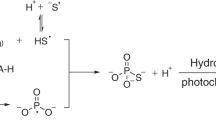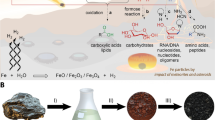Abstract
THERMODYNAMIC considerations dictate the existence of a reducing atmosphere on the Earth during the synthesis of prebiological organic compounds1. Most of these molecules have been synthesized from methane, ammonia and water, or compounds derivable from these, using ionizing radiation, ultraviolet light or electrical discharges2. If the atmosphere was derived by outgassing3, the compounds emitted through volcanic processes should have reflected their equilibrium composition in the crust. Once released they would have approached a new thermodynamic equilibrium dictated by cooler surface conditions. Here we explore some of the reactions whereby such a primitive atmosphere4 might have given rise to reduced compounds of C and N.
This is a preview of subscription content, access via your institution
Access options
Subscribe to this journal
Receive 51 print issues and online access
$199.00 per year
only $3.90 per issue
Buy this article
- Purchase on Springer Link
- Instant access to full article PDF
Prices may be subject to local taxes which are calculated during checkout
Similar content being viewed by others
References
Miller, S. L., and Urey, H. C., Science, 130, 245 (1959).
Ponnamperuma, C., Icarus, 5, 450 (1966).
Holland, H. D., in The Origin and Evolution of Atmospheres and Oceans (edit. by Brancazio, P. J., and Cameron, A. G. W.), 86 (John Wiley and Sons, New York, 1964).
Rubey, W. W., in The Origin and Evolution of Atmospheres and Oceans (edit. by Brancazio, P. J., and Cameron, A. G. W.), 1 (John Wiley and Sons, New York, 1964).
Fowler, W. A., Science, 135, 1037 (1962).
Suess, H. E., J. Geophys. Res., 67, 2029 (1962).
Shimazu, Y., Icarus, 6, 143 (1967).
Berkner, L. V., and Marshall, L. C., Disc. Faraday Soc., 37, 122 (1964).
Watanabe, K., Zelikoff, M., and Inn, E. C. Y., Geophys. Res. Pap. No. 21, AFCRC Tech. Rep. No. 53–23 (1953).
Mackay, C., Nicholas, J., and Wolfgang, R., J. Amer. Chem. Soc., 89, 5758 (1967).
Meaburn, G. M., and Perner, D., Nature, 212, 1042 (1966).
Anderson, A. R., Best, J. V. F., and Willett, M. J., Trans. Faraday Soc., 62, 595 (1966).
Dubrin, J., Mackay, C., and Wolfgang, R., J. Chem. Phys., 44, 2208 (1966).
Evans, H. G. V., Freeman, G. R., and Winkler, C. A., Canad. J. Chem., 34, 1271 (1956).
Avramenko, L. I., and Krasnen'kov, V. M., Izv. Akad. Nauk. SSSR, Ser. Khim., 417 (1966).
Miller, S. L., Ann. NY Acad. Sci., 69, 260 (1957).
Abelson, P. H., Proc. US Nat. Acad. Sci. 55, 1365 (1966).
Matthews, C. N., and Moser, R. E., Nature, 215, 1230 (1967).
Harteck, P., Reeves, R. R., and Thompson, B. A., Z. Naturforsch., 19a, 2 (1964).
Author information
Authors and Affiliations
Rights and permissions
About this article
Cite this article
RAFF, R., MEABURN, G. Photochemical Reaction Mechanisms for Production of Organic Compounds in a Primitive Earth Atmosphere. Nature 221, 459–460 (1969). https://doi.org/10.1038/221459a0
Received:
Issue Date:
DOI: https://doi.org/10.1038/221459a0
Comments
By submitting a comment you agree to abide by our Terms and Community Guidelines. If you find something abusive or that does not comply with our terms or guidelines please flag it as inappropriate.



